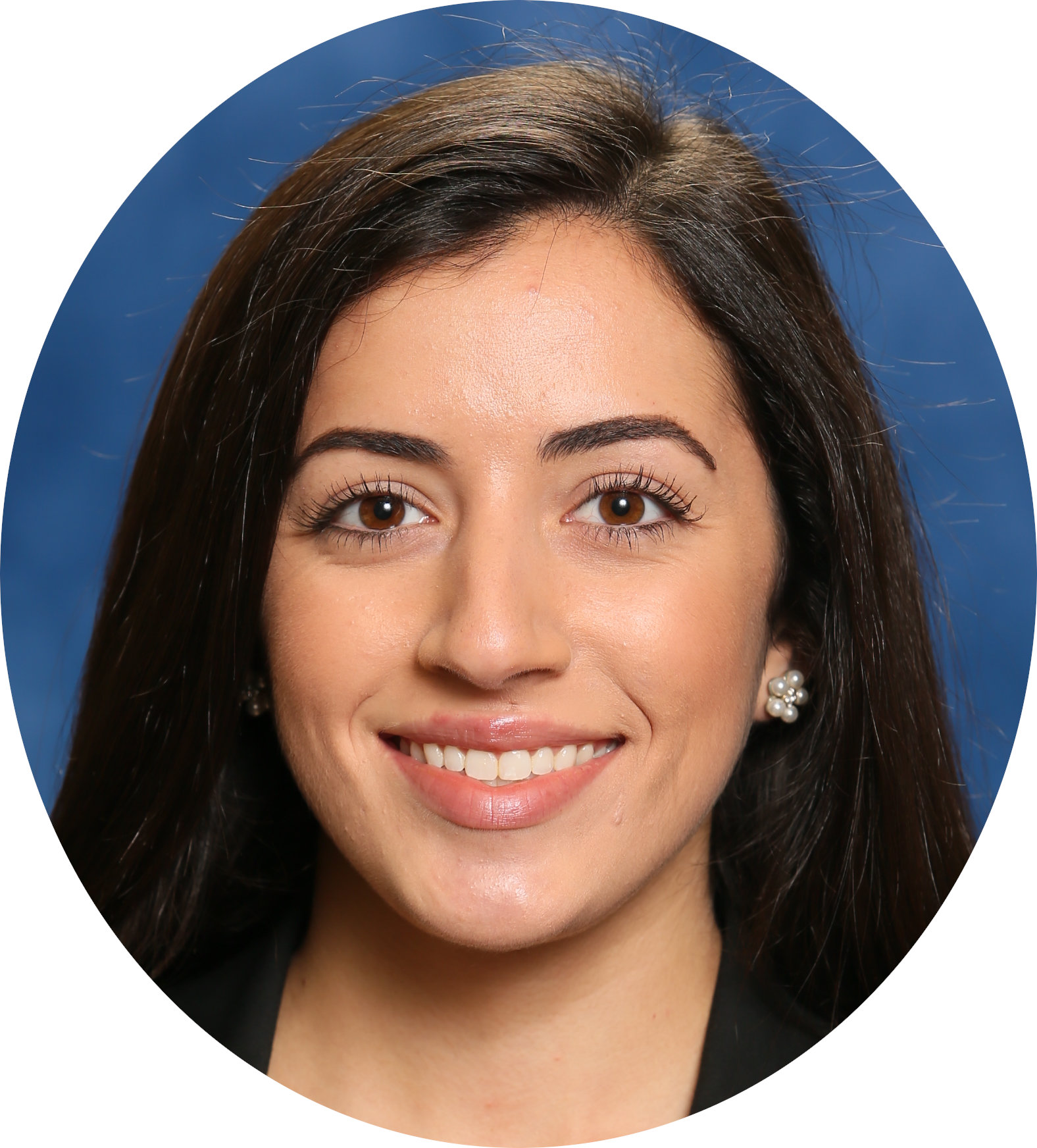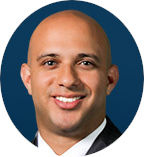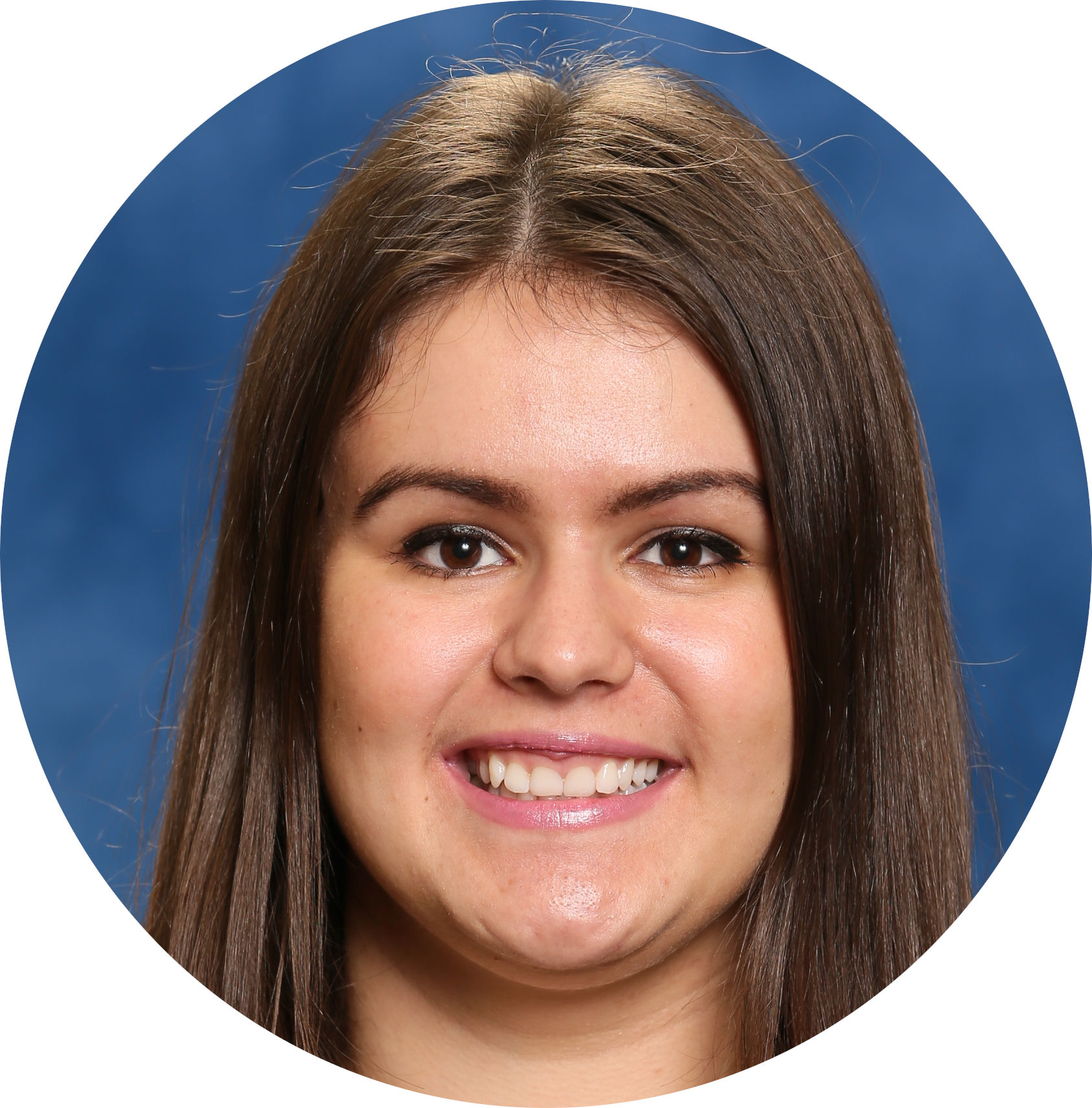Admissions FAQ
Why Detroit Mercy Law?
"I chose Detroit Mercy Law because of the opportunities for involvement in the local legal community. Our school's location in the heart of Detroit provides an advantage to students in terms of networking, volunteering, and obtaining employment."

Jewel Haji '19
“The school gives students a real taste of what it’s like to practice. Recent grads come in prepared and ready to work hard, and it’s not surprising that they are landing and doing well at top law firms in big markets like New York, Detroit, and Toronto.”

Joe Vernon '05 Dual JD
“Serving as a judicial extern at the US Court of Appeals for the Sixth Circuit is the highlight of my experience at Detroit Mercy Law and opened many doors in my legal career. It was an honor to spend a summer at the Court and learn from experienced jurists.”

Margarita Dvorkina '19 Dual JD
"The school is committed to social justice and service. As a first-year student I participated in 1L clinics and assisted veterans and low-income Detroit residents with legal issues. It was a great way to give back to the community."

Jailah Emerson '20
"The location of Detroit Mercy Law and the experience is unlike anywhere else. You are across the river from another country, and you meet both American and Canadian law students. I wanted a school that would expand my network internationally and that is exactly what I got at Detroit Mercy Law."

Lorena Vicky '19
"I am a Chaldean-American, was born in Baghdad, Iraq, and am the mother of three children. I chose Detroit Mercy Law because of the inviting community."

Rita Soka '22
Admissions
Detroit Mercy Law welcomes applications from all qualified candidates who seek a legal education. Our Admissions Committee carefully evaluates each applicant’s file and considers a variety of factors in making admissions decisions, including academic achievement, LSAT score(s), writing and analytical skills, leadership, work experience, and community service. We recognize that a diverse student body enhances our community, and we value individuals who offer unique backgrounds and experiences.
-
Do you have to be Catholic to attend Detroit Mercy Law?
No. Even though Detroit Mercy Law is rooted in Jesuit and Mercy values, we have students from a variety of faith traditions, including those who have no religious preference. Visit the Diversity page for more information.
-
What is Detroit Mercy Law's Mission statement?
Mission of Detroit Mercy Law: University of Detroit Mercy School of Law is a diverse, urban Catholic law school in the Jesuit and Mercy traditions. We seek to educate the complete lawyer through a dynamic curriculum that integrates theory, doctrine, and experiential learning; provides unique global perspectives through transnational educational opportunities; and emphasizes ethics and service to others.
Equal Opportunity Statement: University of Detroit Mercy School of Law is committed to the principle of equal opportunity for all and does not discriminate on the basis of race, color, ethnicity, national origin, ancestry, age, sex, sexual orientation, gender including gender identity and gender expression, height, weight, marital status, familial status, disability, religion, creed, military service or veteran status, or political belief.
University of Detroit Mercy Mission and Vision
Learn more about how Detroit Mercy Law educates the complete lawyer and our Mission.
-
How long will it take me to graduate?
US JD
Study law in the heart of downtown Detroit and immerse yourself in the region's largest legal community. Choose the US JD program duration aligned with your career goals and commitments.- 3-year Full-Time Day
- 4-year Part-Time In-Person Day
- 4-year Part Time Online
- 5-year Extended Part-Time Day
Dual JD
The Dual JD program is the only comparative program of its kind in North America in which students earn two law degrees in three years.JD-MBA
Students typically apply for this program at the end of their first year of law school, although students enrolled in the MBA program may apply to the law school to participate in this program. All students will complete the first year of law school and take a total of 78 credits at the law school. The number of courses required for the MBA varies depending on the academic background of the student. -
Does Detroit Mercy Law offer any concentrations?
Family Law Concentration
A Concentration in Family Law allows interested students to develop expertise in family law while taking advantage of our strong offerings in this area. A student who successfully applies for and completes the family law concentration will receive a designation on the student’s official transcript.Students must complete a minimum of 14 credit hours with a 3.0 minimum GPA in the following courses. Students may not opt to take any of these courses Pass/No Pass.
Immigration Law Concentration
The Concentration in Immigration Law allows students with an interest in immigration to develop expertise in this area by taking a comprehensive range of courses offered at Detroit Mercy Law. Students who successfully apply for and complete the Immigration Concentration requirements will have a designation on their official transcripts.Students must complete 15 credits with a minimum 3.0 GPA in each of the following courses. Students may not opt to take any of these courses Pass/No Pass.
-
Do I need to take any prerequisites before I apply to law school?
New students are required to receive a bachelor's degree before entering law school and must have taken the Law School Admission Test (LSAT) within the past five years. Students can apply to the program before they graduate from their undergraduate institution as long as they will have received their degree by August of the year they are entering law school.
-
Can I submit my application before I take the LSAT?
You may submit your application before taking the LSAT. However, your application will not be reviewed until an LSAT score is received. We will complete and hold the application pending the LSAT score release. You must have taken the LSAT within the past five years.
Applicants must have a high LSAT score in at least the 15th percentile of that test's administration to be considered. We encourage candidates to perform at the 50th percentile or better for admission; however, we consider a range of applicants based on all aspects of the application.
-
What is the latest LSAT a student can sit for to be considered for fall admission at Detroit Mercy Law?
The latest LSAT we can accept for fall admission is June. July results come out too late. It's in a candidates best interest to submit their entire application prior to that so that we can review them for admission as soon as the June score releases. While June is the latest we can accept, it's not ideal, as we typically have limited seats that late in the cycle. But, it's better to be prepared and sit in June than to not be prepared and sit earlier.
-
Are there any entrance exams required for law school?
Students must have taken the LSAT within the past five years and have a current score available. Applicants must have a high LSAT score in at least the 15th percentile of that test's administration to be considered. We encourage candidates to perform at the 50th percentile or better for admission; however, we consider a range of applicants based on all aspects of the application. Applicants may apply before sitting for the LSAT. We will complete and hold the application pending the LSAT score release.
-
What LSAT score and GPA should I have to be admitted?
We encourage candidates to maintain a cumulative undergraduate grade point average at or above 3.0 and to perform at the 50th percentile or better on the LSAT for admission. However, we consider a wide range of applicants based on all aspects of the application. There are no credentials that guarantee admission to the program.
-
Does Detroit Mercy Law require a GRE?
The GRE is not required but students must take the LSAT.
-
Do you accept JD-Next scores?
At this time, Detroit Mercy Law still requires an LSAT score to be considered for admission. We do not accept JD-Next scores.
-
Do I need letters of recommendation?
Two letters of recommendation are required. There are no exceptions made to this requirement. If you graduated within the last three years, at least one letter, preferably two, should be written by a professor or academic advisor who can speak to your academic abilities. If you graduated more than three years ago, you may have two professional references.
Letters of recommendation should speak to your abilities and work ethic.
-
Who should write my letters of recommendation?
Your letter of recommendation should be written by a professor, academic advisor, or supervisor. Letters of recommendation should not be written by family members, family friends, or personal connections. If you have questions about whether a connection is appropriate, please don’t hesitate to reach out to the admissions office at lawadmissions@udmercy.edu.
-
Do my paralegal/criminal justice credits transfer?
Law school is a professional level education, similar to a master’s or other graduate program. A bachelor’s degree is required, and you can have any major, but credits do not transfer in.
-
What undergrad majors/minors does Detroit Mercy Law accept?
Students must receive a bachelor's degree before entering law school. While many students apply in the final year of undergraduate studies prior to receiving their degree, others apply after receiving their degree. All undergraduate degrees are acceptable. Each year, the incoming class includes students with a variety of degrees in liberal arts, education, criminal justice, business, and STEM. We encourage candidates to maintain a cumulative undergraduate grade point average at or above 3.0 for admission; however, we consider a range of applicants based on all aspects of the application.
-
What does Detroit Mercy Law look for in an applicant?
The admissions committee considers a variety of factors in making admissions decisions. We encourage candidates to maintain a cumulative undergraduate grade point average at or above 3.0 and to perform at the 50th percentile or better on the LSAT for admission; however, we consider a range of applicants based on all aspects of the application. Additional criteria include writing and analytical skills, leadership, work experience, and service. We recognize that a diverse student body enhances our community, and we value individuals who offer unique backgrounds and experiences. Visit the Apply Now page for more information.
-
When is Detroit Mercy Law’s application deadline?
The priority application and scholarship deadline is February 15. After this date, the Admissions Committee will still review applications and make offers, however, seats in the incoming class and scholarships are limited.
Applications will still be accepted and read over the summer and offers will be made on a space available basis until August 1. -
When will I know if I am admitted?
The Admissions Committee begins to review applications in Mid-November, and applicants begin to be admitted in December. Detroit Mercy Law makes offers on a rolling basis. The priority deadline for consideration is February 15, but applications are still accepted after this date and offers are made on a space available basis until August 1.
-
What are the Bar Exam Requirements?
The Michigan Board of Law Examiners requires all those seeking admission to the bar to have a JD from a US accredited school, obtain a favorable recommendation from the State Bar of Michigan Character and Fitness Board, receive a score of at least 85 on the Multi-State Professional Responsibility Exam, and receive a scaled score of at least 135 on the bar exam. For a complete set of regulations, visit the Michigan Board of Law Examiners’ website. Visit the Academic Success & Bar Preparation page for more information.
-
How is law school different from other graduate/professional programs?
Law schools traditionally prepare students for careers in law, although the skills acquired in law school are valuable in other fields as well. Coursework and training are rooted in traditional disciplines, but emphasize application for the real world. Most schools require extensive internship or on-the job training in order to graduate.
-
What if I have to take a leave of absence?
Students who wish to step away from their program of study for a defined period of time may request a leave of absence. Students may request a leave of absence for personal, medical, career, or other valid reasons. A request for a leave of absence must be submitted in writing to the Assistant Dean for Student Affairs. A leave of absence cannot be granted for a time period of less than one semester, or less than the time remaining in the semester in which the leave was requested; nor will a leave of more than one full year be granted. Students may request additional leave at the conclusion of a leave of absence. Students requesting a leave of absence will be encouraged to seek counsel from the Financial Aid Office in order to understand the effect that the leave may have on their financial aid and student loans. Grant of the request will not waive the 72-month period for completion of studies.
In the Dual JD program, a student must seek and receive permission for a leave of absence from both Detroit Mercy Law and the University of Windsor Faculty of Law.
-
Can I study abroad during my time at the Law School?
Through Detroit Mercy Law’s International Opportunities Program, you can participate in a summer study abroad program sponsored by an ABA-approved law school.
These rigorous programs expose students to legal studies and practice in over 60 countries around the globe. Visit the Study Abroad page for more information.
-
Is there graduate student housing?
Detroit Mercy Law does not offer graduate student housing. Please refer to the Housing page to learn more about deciding where to live while attending Detroit Mercy Law.
-
What can I do to prepare for law school?
There is no single path that will prepare you for a legal education. Students come from all walks of life and educational backgrounds. Some enter law school immediately after completing their undergraduate studies. Others study law later in life, bringing with them experiences and perspectives gained from previous careers and courses of study. Visit How to Prepare Your Legal Education.
-
Should I apply to law school if I have a criminal record?
Yes! In fact, many current law students and lawyers have asked this same question. Criminal records are not an automatic bar from anyone attending law school, and almost all states allow persons with records to apply to be an attorney.
Your State Bar Will Check Your Law School Application Answers For Accuracy Through An Intensive Background Check
Full candor in the law school application process is required not only by Detroit Mercy Law, but also by the State Bar you will apply for your license to practice law. Your law school application answers will be scrutinized and your entire history checked by Bar authorities when you apply for admission to the Bar, which you must do in order to practice law. Just because a matter no longer appears on your public criminal record does not mean there is no private record of it, and the Bar will check on everything you report.
All applicants to the Bar must establish, by clear and convincing evidence, that they possess the good moral character required for admission, or admission will be denied. Your candor in your application to law school is a crucial indicator of your character and fitness for admission to the practice of law. The Bar will compare your disclosures on your law school application to criminal records and other information about you and if they determine that you have not been forthright, they may deny your admission.
The American Bar Association Standard 504(a) states: "A law school shall advise each applicant that there are character, fitness, and other qualifications for admission to the bar," therefore, applicants are encouraged to contact the jurisdiction in which they intend to practice to learn about that jurisdiction's requirements for admission to the Bar prior to matriculation.
Acknowledging Past Mistakes Does Not Necessarily Mean You Will Not Be Admitted
An applicant might fear that disclosure of negative information such as criminal history or academic disciplinary action, will result in denial of admission to the law school. This is not necessarily so. Where the offenses at issue are remote in time, occurred early in life, are minor in nature, or are isolated incidents, and where an applicant can demonstrate positive growth and change since the conduct in question, admission may still be granted.
Evidence of positive character development is always demonstrated through full and complete disclosure of transgressions and mistakes. Where the conduct at issue is so serious that admission is denied, applicants are still frequently invited to reapply to the law school at a future time after further positive growth and development.
Online JD Program
-
How long will the Online JD program take me?
The online JD program is designed as a part time program that will take four years to complete.
-
What is the format of the online courses?
Online courses will be both synchronous and asynchronous. Synchronous courses will have specific meeting times that students must attend. Asynchronous courses will have assignments with specific due dates, but there are no course meeting times and lectures can be watched at any time.
-
What time will the potential synchronous courses be?
Synchronous courses will generally be in your upper-level years (3L and 4L) and have therefore not been scheduled. The program will keep in mind the necessity of flexibility for most students when scheduling synchronous courses, but it is not possible to predict what time a course 2 to 3 years in the future will be.
-
Are there scholarships available for online students?
All applicants to Detroit Mercy Law are evaluated for scholarships when they apply. All scholarships are merit based, not need based.
-
Do I need an LSAT score to apply for the online program?
Yes. Every applicant to Detroit Mercy Law is required to submit an LSAT score that is no more than five (5) years old.
-
Will I have the opportunity to take a clinic?
Yes. All Detroit Mercy Law graduates are required to take a clinic, whether they are a part of one of our residential programs or our online program.
-
Will I have access to the career services office?
Yes. All Detroit Mercy Law students have access to our career services team who are equipped to help you reach your goals.
Transfer Students
-
Can I transfer to Detroit Mercy Law?
Yes, Detroit Mercy Law accepts transfers to start in both the Fall and Winter Terms. You must have completed at least 24-30 credits at your current law school and no less than half of your credits need to be taken at Detroit Mercy Law. -
Can I transfer to the Dual JD Program?
Transfers are not accepted for the Dual JD program. You are welcome to apply to transfer to our US JD program that does accept transfers.
-
What are the transfer application requirements?
In addition to what is required of a first-year applicant, Detroit Mercy Law requires the following for transfer applications:
- Generally, a 3.0 or above in your law school classes
- An official transcript from your law school
- A letter of good standing from your law school
At this time, transfers applications can only be submitted for the in-person US JD program. Applications are not accepted to transfer into the online or Dual JD programs
-
Do I have to provide an LSAT score to transfer?
Yes, an LSAT score is required to transfer to Detroit Mercy Law. -
What if I am not in good standing with my law school?
Please reach out to Grace Henning, Director of Admissions and Communications, to discuss your situation. She will provide guidance on how you can proceed.
-
Does it matter what law school I went to for my first year?
In order to transfer to Detroit Mercy Law, you must have attended an ABA accredited law school. -
Can I be a guest student at Detroit Mercy Law?
Yes, you may apply to be a guest student at Detroit Mercy Law. Guest students plan to complete their JD at their home institution but plan to take classes at Detroit Mercy Law. Guest students will only be approved to take upper-level courses. First year courses are reserved for Detroit Mercy Law students only.
Programs
Study law at the only law school in the heart of downtown Detroit and immerse yourself in the region’s largest legal community.
-
Are programs offered at night?
The School has suspended its evening program and is no longer enrolling new students into the program. The last evening cohort matriculated in Fall 2017.
-
What are the different program options?
-
What is a US JD/Dual JD/JD-MBA?
US JD
Study law in the heart of downtown Detroit and immerse yourself in the region's largest legal community. Choose the US JD program duration aligned with your career goals and commitments.- 3-year Full-Time Day
- 4-year Part-Time In-Person Day
- 4-year Part Time Online
- 5-year Extended Part-Time Day
Dual JD
As a student in the Dual JD program, you will experience two different legal cultures, often on the same day. The Dual JD program, founded in 1983, is a collaboration between Detroit Mercy Law and Windsor Law.The Dual JD program is a rigorous course of study. Course content is substantial. Most required classes are taught in a comparative format that exposes students to both countries’ laws simultaneously.
JD-MBA
Depending on a student's background, the JD-MBA can be completed in as little as seven semesters, which is only one more semester than typically required for the US JD.Students in the JD-MBA program study legal and business concepts, such as regulatory frameworks, business management principles, accounting practices with tax law, labor management relations with labor law, organizational planning with corporation law, and corporate financing with banking and securities law.
Law students admitted to the program complete the first-year core law school curriculum and then pursue an integrated course of study taking law and business courses simultaneously. MBA program students admitted to the program complete the first-year core law school curriculum after admission and then may pursue an integrated course of study. Students may be full or part time.
Financial Aid
The financial aid professionals at Detroit Mercy Law are available to connect you with resources for financing your investment in your legal education. We take seriously our responsibility to provide you with information and resources that will help you plan your financial future.
-
Can students work while going to school?
Law school requires a significant time investment for success. Students should be realistic about their ability to succeed in light of employment and other commitments. It is important to do as well as you can academically, especially during the first year.
Students are encouraged to reach out to the law school financial aid professionals to learn about options for financing their investment in legal education, including tuition and other costs of attendance, such as living expenses. Click here to learn more about Commitments During Law School.
-
How much does tuition cost?
The Cost of Attendance Budgets are based on direct expenses (tuition & fees) and estimated indirect expenses (housing & food, books & supplies, transportation, and miscellaneous personal expenses) for one academic year; two semesters (fall and winter) spanning nine months. Actual expenses vary based on student lifestyle and personal choices. We want our students to make the best decisions today to make sure they are prepared for tomorrow.
For the 2025-26 school year, US JD tuition rate is $1,616 per credit.
-
Are there scholarships available?
All admitted students are automatically considered for Dean’s Scholarships and Fellowship Awards. The priority deadline for scholarship consideration is February 15. Applicants are encouraged to apply early in the admissions cycle for maximum scholarship consideration. Admitted students who submit a complete application to Detroit Mercy Law by the priority scholarship deadline will automatically be considered for Dean’s Scholarships and Fellowship Awards. Scholarship offers are generally extended at the same time as the offer of admission.
Career Services
With our 9,000+ alumni practicing around the world, you will have access to an extensive network of attorneys, judges, politicians, and business leaders to welcome you to the profession.
-
What can I do with my law degree?
Detroit Mercy Law students and graduates secure positions at top law firms, competitive judicial clerkships, and positions in government, business, and public interest organizations across the US and Canada. Visit the Expanded Career Opportunities page to learn more.
-
Are there internships/externships available?
Gain hands-on experience in judicial chambers, public interest organizations, and government offices while earning academic credit.
While many students choose to complete an externship during the summer after their first year of law school, many externship opportunities are within walking distance of Detroit Mercy Law, which makes it convenient to gain practical legal experience any time of year.
-
In what setting do Detroit Mercy Law graduates typically work?
Detroit Mercy Law graduates work in a variety of fields. Most recent graduates work in law firms of various sizes. However, our career services office will help you find employment that you’re passionate about in any setting.
-
What are the current employment statistics?
Each year, Detroit Mercy Law supports graduates with securing employment and is required to report the employment outcomes of graduates as of ten months following graduation to the American Bar Association (ABA). The Detroit Mercy Law graduating class of 2024 secured an overall employment rate of 93 percent in legal and professional positions throughout the US and Canada. Employment Summary Report, 2024.
For the 2024 Dual JD graduates, 99 percent secured articling or other legal employment throughout the US and Canada. The Dual JD program is the only program of its kind in North America in which students earn two law degrees in three years. Graduates earn a JD from both Detroit Mercy Law and Windsor Law and graduate eligible to be licensed in both the US and Canada. Graduates pursuing licensure in Canada must complete a post-graduation experiential training, similar to an apprenticeship, through articling or the Law Practice Program, before they are admitted to practice law. Learn more about the Canadian & American Dual JD Program. Visit the Expanded Career Opportunities page to learn more.
Faculty and Students
We not only teach the law; we teach how to be lawyers. You will learn the art of lawyering from experienced faculty who are distinguished scholars, well-networked in the legal community, and committed to shaping the next generation of legal professionals.
-
Have the faculty actually worked in the field they teach?
Our students experience a personalized education delivered by inspiring and exceptional faculty who are committed to shaping the next generation of excellent, ethical, engaged lawyers. 100% our faculty practiced in their area of expertise before joining Detroit Mercy Law and bring a wealth of knowledge and real-world experience into the classroom.
-
What is the student to faculty ratio?
Our class sizes are small to ensure professors have the opportunity to get to know you all by name. In your first year, your foundational classes will be around 50 students and your legal research and writing class will be around 25 students. In the upper years, classes range from 6 in our clinics and Law Firm Programs up to 40 in some of the bar-tested electives.
-
Does Detroit Mercy Law have any student organizations I can join?
The student experience at Detroit Mercy Law is enhanced by our diverse array of student organizations. These groups provide an opportunity for connection, service, leadership, and professional development. We encourage students to seek out organizations that align with their interests and goals. We offer 20+ student organizations to join.
-
What support systems are in place for students with disabilities?
DAS operates under the guidelines of the Americans with Disabilities Act (ADA) in the implementation of reasonable accommodations for students with disabilities attending the University of Detroit Mercy.
Under the ADA, reasonable accommodations are adjustments made to assist students with disabilities in having equal access to programs, courses or activities. These adjustments allow students to demonstrate their knowledge in a way that mitigates the impact of the student's disability. Through the use of the interactive process, adjustments are determined on a case by case basis. For more information, visit Student Support.
Alumni
As a future member of Detroit Mercy Law's alumni community, you provide essential support to students by sharing your time, first-hand experience, pride and loyalty by encouraging academically talented students to apply and attend Detroit Mercy Law.
-
How do I join the network of Detroit Mercy Law Alumni after graduation?
As a graduate and member of Detroit Mercy Law’s alumni community, you are part of an alumni network more than 9,000 strong. You can also provide essential support to students by sharing your time, first-hand experience, pride and loyalty by encouraging academically talented students to apply and attend Detroit Mercy Law. Providing perspective as a Detroit Mercy Law graduate is the most important part. Alumni not only bring back the nostalgia from their days at Detroit Mercy Law, but also helps keep the future of the Law School bright.
Other Questions
-
What if I have more questions that weren't answered?
If you happened to have more questions that weren't answered, please email the Admissions team at lawadmissions@udmercy.edu.
